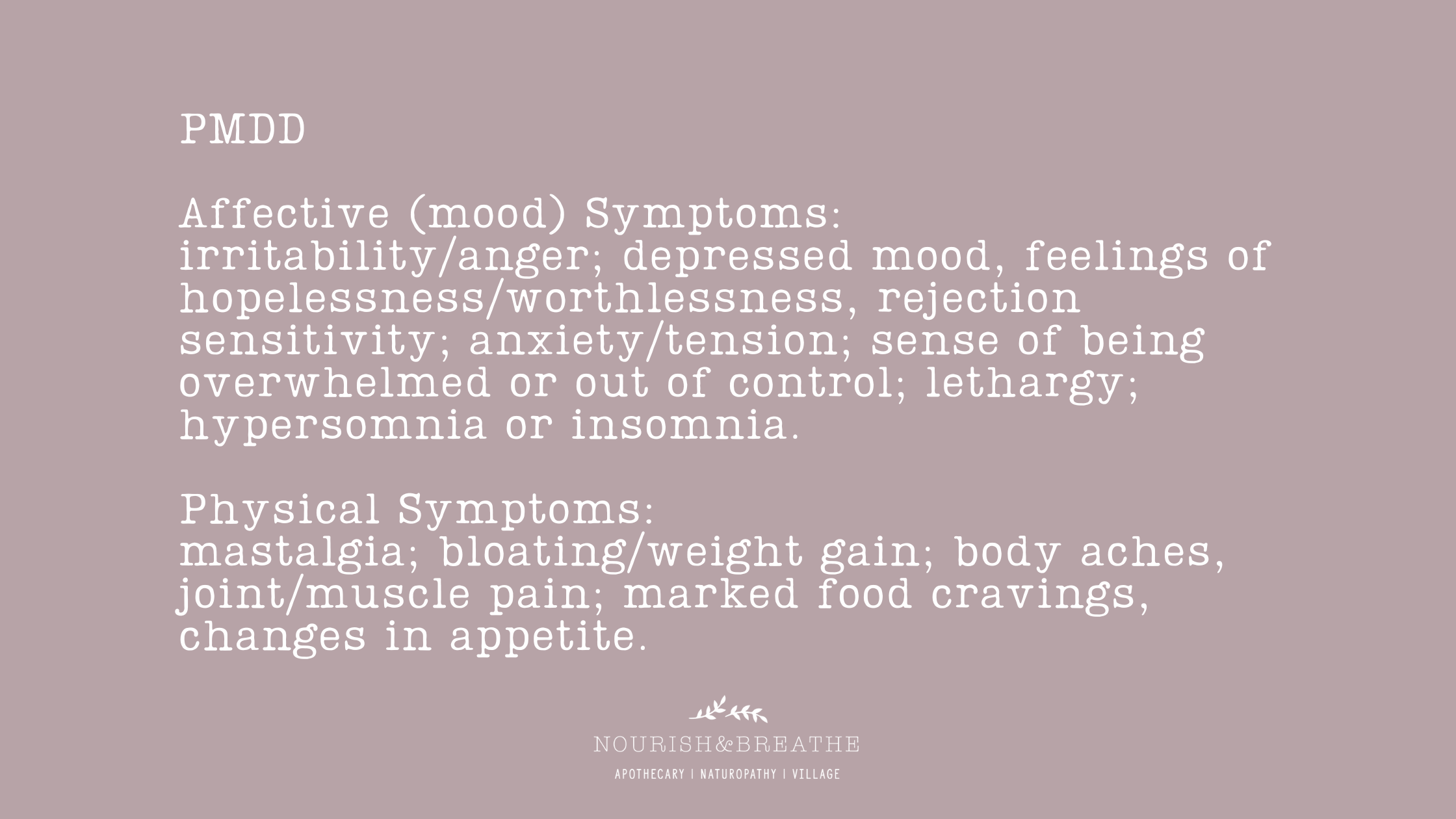PMS & PMDD
Healing and changing your ‘normal’ - it is possible
The luteal phase is the 2 weeks before your menstrual bleed. It is this time of the month that can cause the most discomfort and unsettling symptoms. Premenstrual Disorders (PMD) are reported to occur to some level in 70-80% of menstruating women. Premenstrual Syndrome (PMS) is defined as noticeable symptomatic changes but allow day to day functioning and is experienced by 20-30% of women. Premenstrual Dysphoric Disorder (PMDD) is defined as debilitating and mood-altering changes that affect everyday wellbeing and ability to function in your environment. To understand what can cause these symptoms and then learning how to support yourself during these times can be lifechanging, literally. PMS and PMDD can impact your relationships, your work, and your sense of self-worth and self-confidence. It is not ‘normal’ for you to have to bear with it and carry-on. Small shifts in diet and lifestyle behaviours, and with the support of nutrients can have big impacts on your everyday life.
Do You Have PMDD?
There are defined symptoms to be diagnosed with PMDD according to the American Psychiatric Association. You must have at least 5 symptoms which prevent normal functioning, and at least one symptom must be an affective (mood symptom).
Affective Symptoms: irritability/anger; depressed mood, feelings of hopelessness/worthlessness, rejection sensitivity; anxiety/tension; sense of being overwhelmed or out of control; lethargy; hypersomnia or insomnia.
Physical Symptoms include: mastalgia; bloating/weight gain; body aches, joint/muscle pain; marked food cravings, changes in appetite.
How PMDD differs from PMS lies in the number of symptoms experienced (PMS defined as 1 symptom only) and the degree to which it affects your everyday function.
The diagnosis may be provided by your GP retrospectively i.e. after recording your symptoms for at least 2 menstrual cycles. Unfortunately these conditions are often underdiagnosed as:
the symptoms may be intermittent, and
the symptoms may not be perceived to be legitimate or treatable by either the woman or the GP,
the condition is generally unrecognised medically,
and even normalised as a disorder for women with no need to acknowledge
Whether it be officially diagnosed or not the symptoms experienced before a menstrual cycle and described to me I take very seriously. Women should not have to suffer. The beauty of being a woman is that we have a monthly cycle - a cycle of energy, emotions and connection. Each month we shed and rebirth. Sometimes a change of perspective can be helpful to assist in making the right choices for ourselves.
What is PMDD?
PMDD is actually a complex condition, and I love this definition that demonstrates the complexity:
“ multifactorial, involving complex interactions between hormonal fluctuations and neurotransmitter systems, dependent on genetic and epigenetic predispositions and brain function, exacerbated by life experiences, stressors, HPA axis dysfunction and inflammation.”
That is a mouthful but in essence describes that PMDD has no single cause and may be influenced by hormones, the adrenal and nervous systems (neurotransmitters), your DNA, and your lifestyle and diet. These factors are all within the realms of how naturopathy works - we look at the entirety of you to bring the physical, mental, emotional and spiritual body into balance. There may be no short answer or magic pill to alleviate your PMMD, but instead requires a combination of shifts and changes in diet and lifestyle, herbal tonics and nutrients. The complexity of PMDD is often why antidepressants or anxiety medication don’t work - they are not treating the cause. The pharmaceutical medication may be necessary though to allow recovery to start, to support change to occur, but ultimately do not provide a long term solution to PMDD.
The Interaction between Hormones and Neurotransmitters
There is a connection and interaction between our hormones, primarily oestrogen and progesterone (also indirectly prolactin), and the key neurotransmitters that influence mood - GABA, serotonin, and dopamine. Cortisol also plays a role to exacerbate and provide a driving force to possibly initiate PMDD. Therefore stress and the lifestyle choices and our habits that may influence the progression or sustainment of PMDD if it is occurring for you. The level of inflammation in the body will also influence the level of PMDD you may experience, and inflammation may be driven by stress and gut health.
Nothing occurs within you in isolation.
What Can you Do?
Start.
Just start looking through a different lens. Try to look at the whole picture.
Look at when this started for you? Start recording your symptoms and look for patterns - a stressful period at work/relationship coincides with a ‘bad’ PMDD month. Poor diet (increased takeaways and processed foods) and less movement for the month? Increased alcohol?
Reach out to your GP as a mental health plan can be a great starting point when needed.
In naturopathic clinic we work together. I ask a lot of questions to understand what are the initiating, driving and sustaining factors for you. It is different for everyone and therefore no one treatment approach. We work out what needs to shift, what needs support and go forward from there. Blood hormone testing at specific times of the month for better interpretation may be useful. Herbal medicine can literally be unsurpassed in providing the assistance and support you need to guide the interplay of all factors back into balance.
Please reach out for further guidance and naturopathic treatment that can assist and guide you back to wellness.
See me in naturopathic clinic or at the apothecary for nutrient and herbal medicine to support the nervous system, gut health, hormonal health, stress, detoxification and methylation pathways.





